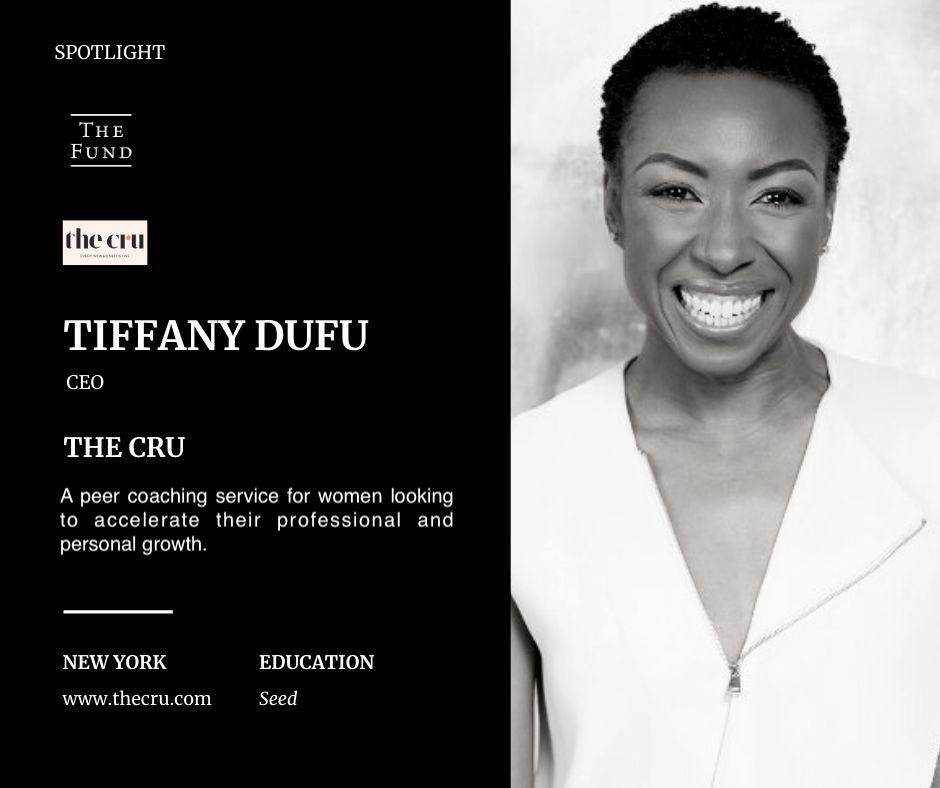The Fund Founder Spotlight Interview: Tiffany Dufu of The Cru
The Fund is a founder community and early stage fund, by founders for founders.
Welcome to The Founder Spotlight where we highlight the incredible people behind the companies we’ve backed at The Fund. This week the spotlight is on Tiffany Dufu, founder and CEO of The Cru, a peer mentorship platform that connects women looking to accelerate their professional and personal goals.
Everyone needs a crew! We all need people to depend on, seek advice from, and who push us to become better people, both personally and professionally. For some this comes naturally, but for most it’s a challenge, and in particular for women seeking peer support. Busy schedules, home responsibilities, and lack of contacts makes it difficult to find a group of women to relate to and lean on for growth. That’s where Tiffany Dufu, founder and CEO of The Cru comes in. She created a platform with an algorithm that connects women committed to helping each other thrive. Groups of 8 are matched based on their personality, values, demographics, and life goals.
Tiffany is no stranger to the limelight. She is the author of the best selling book Drop the Ball: Achieving More by Doing Less; a memoir and manifesto that shows women how to cultivate the single skill they really need in order to thrive: the ability to let go. She is a strong voice in women’s leadership and was named to Entrepreneur's 100 Powerful Women and Fast Company’s League of Extraordinary Women. In her ongoing mission to help women, she’s taking the “work” out of “networking” by giving them their Cru!
How did you come up with the idea for The Cru and why now?
I don’t feel that I came up with the idea for the Cru, I feel like it came to me. I was meeting with a woman who explained how difficult it was to get invited to the cocktail party, or conference, or event, and introducing herself to strangers. That’s when I had what I call a “Tiffany’s Epiphany,” what some people call an “aha” moment. It became very clear to me that I should probably stop preaching to women about how they need to find a Cru, and I should probably just find the Cru.
What’s your purpose; what makes you tick?
My life’s work is advancing women and girls. That’s pretty much why I’m on the planet. I’m a cumulative investment of a lot of people and one of the observations I’ve made is that even though we have a lot of people around us- our family, our friends, and our co-workers- a lot of women perceive our leadership journey as a solo endeavor. If we have a problem the first question we often ask ourselves is, “How am I going to solve this problem?,” when I happen to know the more important question is, “Who’s going to help me solve this problem?”
How many people is The Cru currently serving?
Over 1,200 women. It’s exciting, especially given that at the top of COVID we were at 193. We’ve grown 600%.
What’s something interesting about you that most people don’t know?
I read A LOT of books. People ask me how I read so many books; it’s because I don’t watch television. I think a lot of people do, but that’s how I have time to read so much.
Speaking of books, what are some of your favorite startup focused books?
I’m obsessed with books. I think some of the best ones, especially for founders, are books about leadership and self-awareness.
My favorite book right now is Cicely Tyson’s Just as I Am: A Memoir.
Another of my favorites is by my friend Amy Cuddy called Presence. It’s about what presence really is and about real authenticity. In order to inspire other people they have to believe you, but no one will believe you unless you believe yourself and what that means.
A book by my friend Tasha Eurich is called Insight. It’s about self-awareness and how we all think that we’re self-aware, but really we’re not as self-aware as we think.
I have to give a plug to Patrick Lencioni. I just read The Advantage: Why Organizational Health Trumps Everything Else in Business. He includes the six critical questions that every organization needs to answer in order for it to be healthy. It’s basically about how organizational health trumps everything else.

